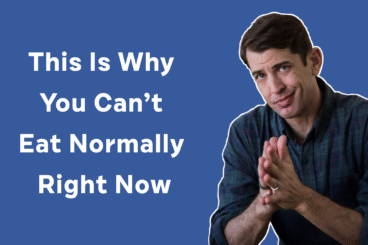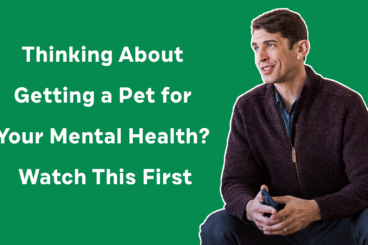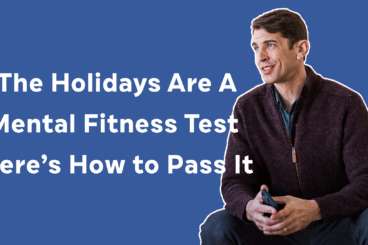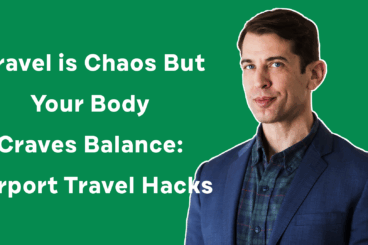When thinking about your mental health and your mental fitness, I wanted to talk about what is in your way. Mental fitness, of course, is the knowledge, the skills, and habits I want to get you into to best take care of your mental health. That’s the way that we build mental health. It is just like physical fitness, but for our mental health. That’s what my book Healing the Modern Brain is all about. In the book I go through the major barriers today for mental fitness. This book is about modern brains and modern brains are living in a different context. Your brain is living in a different context nutritionally and it’s different in terms of a variety of things that again, are getting in the way of you having optimal mental health. Let’s get into these ideas that I frame up in the book. I just wanted to share them with you so you can think about how they’re affecting you.
Devices
So number one is devices. I don’t just say smartphones because there are a lot of devices that have crept into our lives, whether it’s our tablets, our self-monitoring rings and watches and bracelets etc. There are a lot of devices. Some of this is great- more data, more access. I like it when I forget to send a check or pay someone that I can do that wherever I am or if a patient needs to get a hold of me. It’s great to have a smartphone but what we’ve seen happen is where we’ve gone from spending no time on our smartphones to spending six, eight, ten hours a day, doom scrolling endlessly. This is just not helpful to our mental health.
There are a couple of reasons behind this. One that I think doesn’t get emphasized enough is when you sit passively and take things in by the algorithm, it’s deciding what we like, and beginning to define you as a person. We don’t want the algorithm to be what’s defining you as a person. We want you to make more active choices. In Healing the Modern Brain, that’s actually the tenet of engagement. That’s what that’s all about. Devices are one of the things robbing your mental health. How can you know this? Well, if it’s the last thing you do at night and first thing you do in the morning, you can tell if you are anxious about having time away from your phone or you can’t really remember the last time you were away from your phone. You can also see it in the breakdown of other procedures or other things that are important in your life. For example, if all you do is take notes on your phone, you’re not really spending time journaling or producing anything in the written form.
Vices and Substances
Right along with devices are vice and substances. Most often in America, this is going to be alcohol, and increasingly cannabis, as well as other substances of abuse that creep into people’s lives, whether it can be ketamine or opioids or nicotine for example. We have a lot of habit forming addictive substances that generally are really bad for your mental fitness. First of all, dependency and addiction is hard for mental fitness because you’re dependent on something and you don’t feel well, unless you have it. Your mind is oriented towards getting it. It’s what you think about and pursue more than anything else and that causes all kinds of problems in your interpersonal relationships.
I really try to highlight the data in Healing the Modern Brain. How I was trained as a physician was to say you can drink two drinks a day if you’re a guy and if you’re a woman, you can drink one. It felt a little sexist and also was one of those situations in medicine where all of us say the same thing and I get a little suspicious of those situations because usually they’re based on one or two studies. We’re all saying the same thing but there’s not a ton of data and when the data begins to come out, it shows us alcohol really in any quantity is quite bad for your mental health, bad for your cancer risk, bad for your heart health, and I would say there are a lot better ways to have fun on a Friday night.
The data on cannabis came back quite recently, suggesting that it actually increases heart disease. In the most recent dataset, people who took edibles had a higher risk of heart disease than people who smoked cannabis. Now, this may sound like I’m a straight laced, boring guy who doesn’t want you to ever have any fun, and that’s not true. I actually want you to have fun, and I’m really curious what happens to you? Begin to think about actually having fun, not just messed up.
Vices and substances are kind of out of control in our culture in a way that that’s how we define connecting. It’s around every event. We’re talking about a mental health epidemic and improving our mental health on one hand, while on the other hand, we’re wanting to have all kinds of specialty drinks, cocktails, brew pubs and lots of wild products in terms of substances. Whether you’re in a state that has mushrooms or it’s one of these nootropic very stimulating substances. So these substances are one of the things probably in the way of your optimal mental fitness.
Pollutants and Toxins
Next up is environmental pollutants and toxins. Many people have lots of things that I would call toxic in their personal care products. This feels like part of the integrative medicine world where we want to get rid of all the chemicals, and that’s not where I’m coming from. I’m coming from the standpoint that there are molecules that have crept into our environment. For example, if you use cosmetics, or if you use a scent or if you have indoor candles, these are all sources of lots of molecules that are not good for you. Indoor candles are horrible for your lungs. A lot of makeup has estrogen, hormone disrupting chemicals, and pollutants, like phthalates and BPAs which are plasticizers. We’ve now come to understand that these end up in our brain. I don’t want to fearmonger but I do think that personal care products, food choices, certain choices about your environment are important to consider. For example, back when I was a New Yorker I was running and biking next to the West Side Highway, which is a big three lane highway and it didn’t feel very good. I switched. I started running in Central Park. Is that the cleanest, purest air? No, but it’s a lot better than being right next to the highway. This is a kind of obvious example but this was a moment where I needed to reduce my toxin exposure by shifting where I exercised.
Ultra-Processed Food
After pollutants and toxins, the next step that I think about in Healing the Modern Brain is around ultra-processed food. I’m a nutritional psychiatrist. I’m one of the pioneers in this idea that food plays a role in our mental health. It gives us an opportunity to make choices where we get more of the nutrients that the brain needs and fewer of the things that the brain doesn’t need. Ultra processed foods are when we take some sugar, maybe a little fiber, some seed oils and industrial fats as well as some food colorings and emulsifiers, and put it together and we call it key lime pie or low fat yogurt. Now, of course, we process lots of food. We chop vegetables, we sautee things in olive oil. That’s cooking. Ultra processed foods are foods that are made in factories. One of the taglines we hear is “they’re made for the shelf, not for your health.” One of the challenges with these foods is they’re missing some important components for our mental health and mental fitness. They’re missing fiber or they only have select types of fiber. They’re missing some of the more important nutrients like long chain omega fats. There are some minerals and vitamins that are just better in nature. There are eight forms of vitamin E in nature. There are multiple forms of folate in nature. In processed foods there is just one form. Ultra processed foods do have a role in some people’s lives such as busy students who need a protein bar or protein powder or if you’re on a road trip and need some fast food. What we want to do is really try and minimize the ultra processed foods in your diet. It means on that road trip, I’d rather you have a few bags of raw almonds, walnuts and some chocolate chips even.
Chronic Stress
The last thing, destroying your mental fitness, that is in some ways, omnipresent, is chronic stress. All this stuff, the devices, the pollutants, the toxins, the alcohol, the ultra processed food, what’s it all lead to? It leads to chronic stress. Chronic stress at the biological level is when our inflammatory systems go off too much. If you’re trying to concentrate and take an exam and the fire alarms go off in your school, you’re not going to do as well on that exam. So chronic stress is, in some ways, distracting our body. It’s utilizing our alarm systems when there’s no fire, and it’s very hard on us. It’s also very hard psychologically. When we’re in a stressed state, it’s harder for us to listen. It’s harder for us to take a deep breath and remember to breathe. It’s harder for us to be compassionate and have empathy for people around us. It’s much harder for us to be involved in healthy interpersonal relationships.
Another thing with chronic stress is it really destroys our sleep. As you’ll read in Healing the Modern Brain, sleep removes the waste from our brain. We generate about seven grams of waste every day, and it oozes out of the brain at night. So chronic stress, again, has all kinds of negative effects on our health. What I find a lot of times in my practice is people are kind of habituated to it. You ask them about what’s going on and they say, “oh, I’m so stressed. I’m overbooked. I’m stressed about this,” and there isn’t so much of an action plan.
A lot of us are in a somewhat passive and I even say at times, helpless state so it makes sense that we’re stressed. We have stressful periods in our lives. Some of you have aging parents or stress with kids or work stress. I think being in a state of chronic stress really prevents you from achieving optimal fitness. Yes, the world is filled with stress. Yes, our lives are filled with challenges, but everything that we can do to care for the self, to minimize the impact of those, to really regulate our stress response, those are wins for your mental fitness and your mental health.



